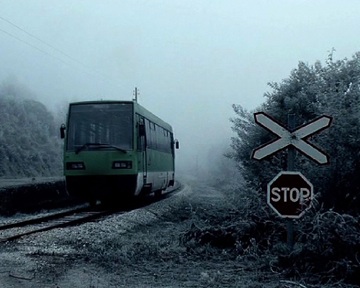The trains don't come here anymore... April 01, 2011
This is a very-very sad story.
Seven years ago, I lived in Portugal for 11 months, in the beautiful city of Lisbon. But the most exiting place and the most wonderful hour during the whole year was a train trip in Tras-os-Montes, North-East Portugal. A narrow railway line was built over a hundred years ago with the help of human hands only, and so it is winding around the mountains, without passing through them, and balancing dramatically high up on the steep hills, above a breathtakingly beautiful river valley, while taking hear-pin turns. Still, the local people persuaded me: there is yet another railway even more beautiful than this, a little more towards the East, between Tua and Mirandela villages... and that story stayed haunting my mind ever since.
So in 2010, I travelled again to Portugal, taking the direction to that part of Tras-os-Montes where time had stopped and people were leading a peaceful life, as if the place were beyond the edge of Europe. I was too late. The line which was created in 1887 and blessed by the king of Portugal Luis I himself, a masterpiece of engineering of its own time, was closed on 1992, because the development of this distant area was not among the priorities of the government. For the last ten years, there has been a great mess with the line: sometimes, some parts of it function for a few months, then, due to an occasional accident or malfunctioning, the whole line is closed again for months or even years. For the moment, there's something like a “tramway” covering about 15 km of the line, but just when you get to the mountains, the service is continued by a bus, to take you to Tua, driving fast on the curvy roads. When I was taking the line, there were three of us in the “tramway”, and only two in the bus, fighting with the nausea, both of us Estonians.
This is precisely the kind of statistics that the local politicians can use for gaining credibility in the capital: “Nobody needs that line anyway”. Portugal would win much more, on its way to progress, from a hydroelectric station. Which would completely ruin the Tua river's ancient valley and drown the old railway line. Not to mention that if the state were to invest some money into restauring the railway, making a suitable traffic plan for the locals and advertising it on the European tourist networks, the situation would clearly be the opposite. Every village where the trains have been taken away, has lost 10-30% of its inhabitants – as a Green Party member states in the film.
Portuguese filmmaker Jorge
Pelicano gives an overview of all this situation in his film “Stop,
listen, look”, concentrating mostly on the locals' point of view.
He won a first price on the Portuguese documentary festival
Doclisboa, although some other filmmakers saw too much of a TV show
in it. For an Estonian viewer, there's nothing to it: poetic visual
metaphors and village still-life with old men and cats is by no means
suited with a quick TV-style editing. Perhaps the film was trying a
bit too hard to prove its point by symbolic language – the death of
the train and the images from graveyard, a small boy removing the
pebbles from the water's way, politicians' dishonest words
illustrated by the images proving the opposite... all of these
symbols were very powerful, but perhaps one of these would have been
enough. Still, the methods of the film serve the purpose, as
Pelicano's film supports the right fight and the politicians' empty
words must be brought out into light as much as possible. During the
very week of Worldfilm, the Portuguese prime minister Jose Socrates,
who we saw “building a great dam” in his speeches, resigned from
his post – Portugal is broke and nobody knows what will come of the
dams, railways, or the country itself.
If you want to step out of the filmworld into reality for a moment, you can show your support to the Tua railway by signing the petition here: http://www.petitiononline.com/tuaviva/petition-sign.html
Mele Pesti
